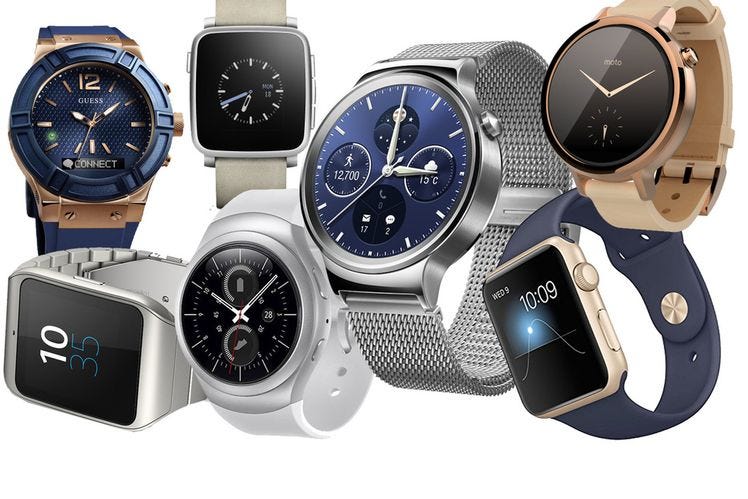Watches are more than timekeeping devices, they are fashion accessories and symbols of status. The advent of smartwatches has added a new dimension to wristwear by blending technology with tradition. Do you go digital or stick with classic analog?

Traditional Watches: Timeless Elegance and Craftsmanship
Pros:
Aesthetics and Craftsmanship: Traditional watches are celebrated for their artistry and intricate designs. Brands like Rolex, Omega, and Patek Philippe are synonymous with luxury and craftsmanship. These timepieces often feature meticulous hand-assembled components, making them not just devices but works of art.
Longevity: A well-maintained traditional watch can last a lifetime and beyond, often becoming a cherished family heirloom. The robust build and timeless appeal ensure that these watches do not become obsolete.
Status Symbol: Owning a high-end traditional watch is often seen as a mark of success and sophistication. The brand and model can convey a message about the wearer’s taste, wealth, and status.
Simplicity and Reliability: Traditional watches are typically powered by mechanical or quartz movements, which are highly reliable and require minimal maintenance. Their simplicity can be a major advantage for those who prefer straightforward functionality.
Cons:
Limited Functionality: Traditional watches primarily serve to tell the time and, in some cases, the date. While complications like chronographs and moon phases add functionality, they still can't compete with the myriad features offered by smartwatches.
Maintenance Costs: High-end traditional watches often require professional servicing every few years to ensure accuracy and longevity. This can be a costly affair, especially for luxury timepieces with complex mechanisms.
Inflexibility: Once made, traditional watches cannot be upgraded or customized beyond changing straps or minor modifications. This limits their adaptability to new trends or personal preferences.
Smartwatches: Modern Technology and Versatility
Pros:
Multifunctionality: Smartwatches go far beyond telling time. They can track fitness metrics, monitor heart rate, provide GPS navigation, send notifications, and even make calls. Brands like Apple, Samsung, and Garmin offer watches that function as extensions of your smartphone.
Customization: Smartwatches offer a high degree of customization. Users can change watch faces, apps, and functionalities according to their needs and preferences. This adaptability makes them highly versatile.
Health and Fitness Tracking: For fitness enthusiasts, smartwatches are invaluable. They can monitor steps, calories burned, sleep patterns, and various other health metrics. Advanced models can even perform electrocardiograms (ECGs) and detect irregular heartbeats.
Convenience: Having a smartwatch means having a mini-computer on your wrist. Quick access to messages, emails, and other notifications without needing to reach for your phone can be a significant convenience.
Cons:
Battery Life: One of the main drawbacks of smartwatches is their battery life. Unlike traditional watches, which can run for years on a single battery or indefinitely if mechanical, smartwatches often require daily or weekly charging.
Durability and Longevity: Smartwatches, being electronic devices, are prone to obsolescence as technology advances. What is state-of-the-art today might be outdated in a couple of years. This reduces their lifespan compared to traditional watches.
Design and Aesthetics: While smartwatches have improved in terms of design, they generally lack the elegance and timeless appeal of traditional watches. Their tech-centric look may not suit all formal or classic settings.
Privacy and Security Concerns: With increased connectivity comes the risk of privacy and security issues. Smartwatches that collect health data or connect to various online services may pose risks if not properly secured.
Making the Choice: What’s Right for You?
The decision between a smartwatch and a traditional watch ultimately comes down to personal preference and lifestyle needs.
Choose a Traditional Watch if:
- You value timeless elegance and craftsmanship.
- You are looking for a long-term investment or an heirloom.
- You prefer simplicity and reliability without frequent charging.
- You see your watch as a status symbol.
Choose a Smartwatch if:
- You want a multi-functional device that integrates with your digital life.
- You are focused on health and fitness tracking.
- You prefer customization and versatility in features.
- You value the convenience of quick access to notifications and apps.
Conclusion
Both
traditional watches and
smartwatches offer unique benefits and cater to different needs and preferences. Traditional watches stand as symbols of elegance, heritage, and enduring value, while smartwatches excel in functionality, convenience, and adaptability. Understanding the pros and cons of each can help you make a choice that aligns with your lifestyle, values, and expectations. Whether you opt for the timeless charm of a traditional watch or the cutting-edge features of a smartwatch, you are sure to find a companion that suits your wrist and your world.
